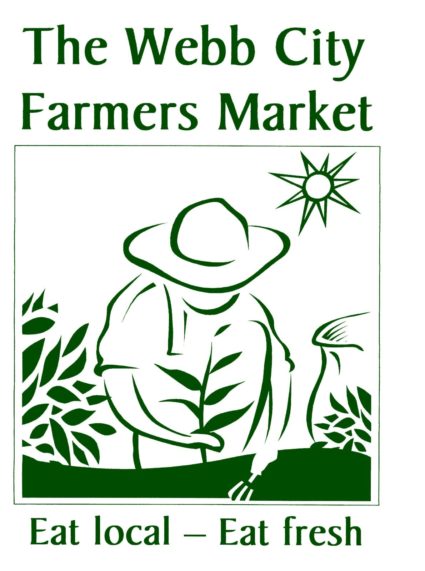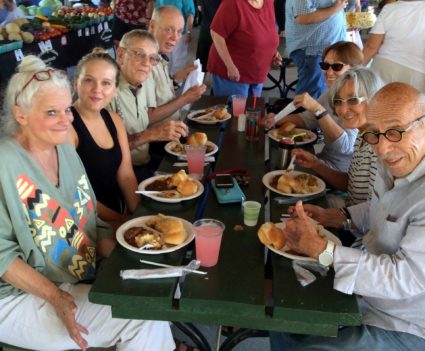How Business Structure and Market Governance Decisions Built a Stronger Market
 Webb City Farmers Market is incorporated with the State of Missouri as a Nonprofit Corporation, and holds federal 501(c)(3) tax exempt status. The market runs many educational and charitable programs, making nonprofit incorporation a good fit, and federal 501(c)(3) status is helpful for fundraising efforts.
Webb City Farmers Market is incorporated with the State of Missouri as a Nonprofit Corporation, and holds federal 501(c)(3) tax exempt status. The market runs many educational and charitable programs, making nonprofit incorporation a good fit, and federal 501(c)(3) status is helpful for fundraising efforts.
When the market began in 2000, it operated under the umbrella of the city Chamber of Commerce, primarily so that it could be included on the city’s festival insurance policy. Eileen Nichols, the current market master, started the market under the auspices of the chamber when she chaired their downtown committee. After about five years, the Chamber suggested the market become independent, and incorporating as a nonprofit was the natural choice. Market leaders were familiar with other nonprofits like the library, historical society, and downtown improvement association; Eileen Nichols explains that “we really felt we were a nonprofit.”
Board Structure and Processes

Photo Credit: Eileen Nichols
The Webb City Farmers Market Board is composed of seven members, each of whom serve one year terms. At the annual meeting, the general membership selects four vendor board members, at least one of whom must be a produce vendor. The market is a producer-only market, which means that a vendor must be a farmer.
Each year, immediately following the annual meeting, the farmers market hosts an organizational board meeting at which the four elected vendor board members select the remaining three board members. The appointed members include a city liaison (currently a member of the park board), one of the four volunteer managers (presently Market Master Eileen Nichols who also serves as secretary/treasurer) and one volunteer from the community. The board also elects officers for one year terms.
The board meets after market on the third Saturday of each month. The president runs the meeting, or in their absence, the vice president. The market master creates the agenda with input from the president and paid manager. Ad hoc committees are appointed to take care of specific issues like volunteer recruitment or strategic planning.
The board is covered by Director & Operator (D&O) insurance.
Market Management
The design of the management of the market was developed by Eileen Nichols; she offers more detail on that structure:
"When we hired a part time manager, I thought we needed to give him the market manager title so I switched to market master. The role is basically what I kept from the original job--all the P.R., all the grant writing, all the education, all the inspections, lead organizer. The manager handles most day-to-day operations at the market including scheduling volunteers. I am usually at the market too but not at the info desk. The market manager is part time--about 20 hours a week. He is in charge of most setup and takedown as well as many other things on day of market. He also does some of the record keeping and manages market kitchen.

Photo Credit: Eileen Nichols
We also have a part-time assistant who staffs the information tables, along with about five volunteers who work one or two markets a month. Most of our record keeping and bookkeeping/payroll is done by a volunteer CPA and we also have a volunteer software writer. In addition, we have a volunteer who runs our market cart bringing folk in and out to distant parking on our busiest days and another who helps with setup and takedown on Saturdays. We have a master gardener who does a Children's Garden Club twice a month with activities for kids at the market. We have several master gardeners who assist with the market’s Kids Community Garden which is located on school grounds. And, of course, I'm a volunteer."
The board interacts with both the market master and the paid manager; both attend and are present at board meetings. Decision-making is divided--for example, when deciding the end date for the 2017 season's Thursday market, the market master consulted first with the manager, second with present board members, and finally with all member vendors present at the market This decision was then ratified by the board at the regular meeting.

Photo Credit: Eileen Nichols
The market master gives the board a financial overview at each board meeting. The market master is authorized by the board to seek any grants that she feels would benefit the market or its mission. The market is in the process of revamping their accounting system. They have a volunteer CPA who handles the accounting. The master and manager positions are currently in transition. A board committee is evaluating what the future looks like without Eileen, considering how tasks will be reallocated among manager, assistant, volunteers and vendors.
Key Takeaways:
- 501(c)(3) status is appropriate when it fits the market’s mission and activities--it is not right for every market. Webb City Farmers Market currently manages five active grants and runs a children’s garden, training for growers, cooking classes, a gleaning project, and more--501(c)(3) status reflects and facilitates these fundamental goals. But markets without appropriate 501(c)(3) programming should not take on additional programs just to qualify. (For more information on 501(c)(3) status and other tax categories for nonprofit organizations, click here.)
- Management structures should reflect the skills and availability of boards and managers. When Webb City hired a new market manager, their management structure allowed the flexibility to tailor roles to the skills of the new manager and the person transitioning from manager to market master. (For more information on why business structure matters, click here.)
